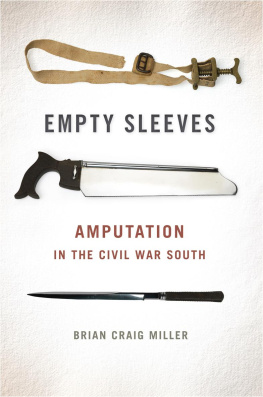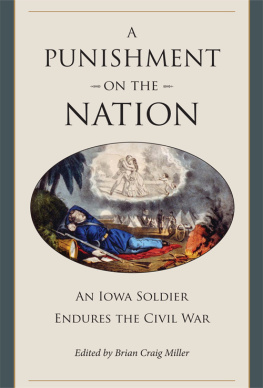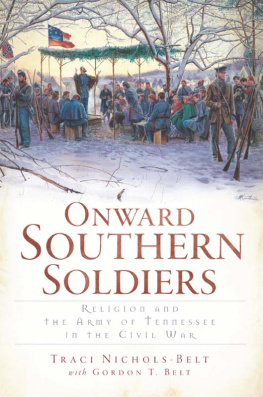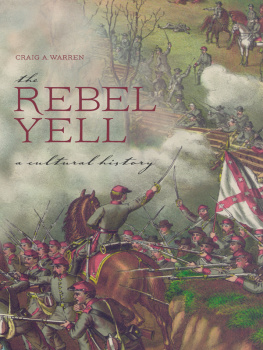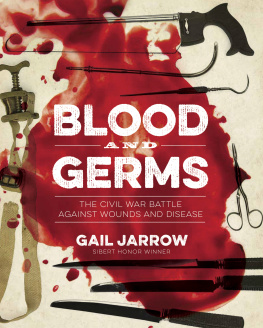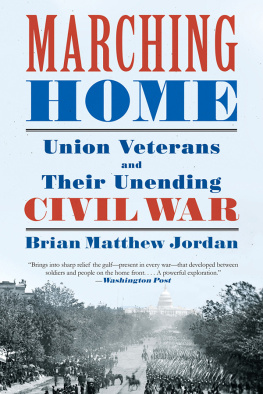Portions of the introduction and were originally published in Lawrence Kreiser and Randal Allred, eds., The Civil War in Popular Culture: Memory and Meaning (Lexington: University Press of Kentucky, 2014), 2544. Portions of the introduction were originally published online, New York Times Opinionator Blog, Disunion, December 20, 2013.
2015 by the University of Georgia Press
Athens, Georgia 30602
www.ugapress.org
All rights reserved
Set in Berthold Baskerville by Graphic Composition, Inc., Bogart, Georgia.
Most University of Georgia Press titles are
available from popular e-book vendors.
Printed digitally
Library of Congress Cataloging-in-Publication Data
Miller, Brian Craig.
Empty sleeves : amputation in the Civil War South / Brian Craig Miller.
pages cm
Includes bibliographical references and index.
ISBN 978-0-8203-4331-0 (hardcover : alkaline paper) ISBN 978-0-8203-4332-7 (paperback : alkaline paper) ISBN 978-0-8203-4333-4 (ebook) 1. United StatesHistoryCivil War, 18611865Medical care. 2. AmputationSocial aspectsSouthern StatesHistory19th century. 3. Surgery, MilitarySouthern StatesHistory19th century. 4. United StatesHistoryCivil War, 18611865Veterans. 5. Disabled veteransSouthern StatesSocial conditions19th century. 6. AmputeesSouthern StatesSocial conditions19th century. 7. MasculinitySocial aspectsSouthern StatesHistory19th century. 8. United StatesHistoryCivil War, 18611865Social aspects. 9. Confederate States of AmericaSocial conditions. 10. Southern StatesSocial conditions19th century. I. Title.
E625.M55 2015
973.7'75dc23
2014023161
British Library Cataloging-in-Publication Data available
ACKNOWLEDGMENTS
The genesis of this book emerged in the spring of 2003, when I was taking a graduate seminar in Reconstruction at the University of Mississippi. My professor, Nancy Bercaw, encouraged me to explore amputation in the aftermath of the Civil War within a gender framework. Her insights, encouragements, and careful readings of early drafts of my main arguments have been invaluable, and I owe a great deal of debt to her.
I am continually humbled by the proficiency, exuberant assistance, and diligent patience of archivists and librarians across the country. I am grateful to the following archival and library staffs, who made hundreds of lonely hours in the archives a pleasurable and productive experience: the Virginia Historical Society, the Library of Congress, the National Archives, the University of Texas at Austin, the Texas Land Grant Office, the Mississippi Department of Archives and History, the Louisiana State Archives, Manuscripts and Special Collections at Perkins Library at Duke University, the Southern Historical Collection at the University of North Carolina at Chapel Hill, the Arkansas State History Commission, the University of Arkansas Special Collections, the Florida State Archives, the South Caroliniana Library, the South Carolina Department of Archives and History, the South Carolina Historical Society, the University of Georgia, Emory University, the Atlanta History Center, the Georgia Archives, Missouri State Archives, the University of Kentucky, Kentucky Department for Libraries and Archives, Kentucky Historical Society, Auburn University, the University of Alabama at Tuscaloosa, and the Alabama Department of Archives and History.
In addition, at several research locations, staff members and archivists eagerly embraced my project and went the extra mile to hunt for obscure sources. I am humbled by the following individuals who made the research for a book like this possible: John Coski and Teresa Roane at the Museum of the Confederacy; Lorri Eggleston and Terry Reimer at the National Museum of Civil War Medicine in Frederick, Maryland; Eric Boyle at the U.S. Army Medical Museum; Jean Carefoot at the Texas State Archives; Jennifer Ford at the University of Mississippi; Lee Miller, Sean Benjamin, and Eira Tansey at the Manuscripts and Special Collections at Tulane University; Siva Blake at the Historic New Orleans Collection; Tara Laver, Gabe Harrell, and Germaine Bienvenieu at LSU in Baton Rouge; Darla Brock at the Tennessee State Library and Archives; Darrell Meadows and Jennifer Duplaga at the Kentucky Historical Society; Jason Stratman at the Missouri History Museum; Tamoul Tee Quakhaan at the Free Library in Philadelphia; Jeanie Braun and Kristine Kruger at the Margaret Herrick Library connected to the Academy of Motion Picture Arts and Sciences, and Mike Flannery and the ever diligent Peggy Balch at UAB.
Researching around the South requires extensive financial resources, and thus I am indebted for the financial support that came in the form of research fellowships at the Kentucky Historical Society and the Reynolds Historical Fellowship at the University of Alabama at Birmingham Medical School. I am also grateful to Emporia State University for a summer research grant that allowed me to research across five states.
The supportive and diligent hands of the staff at the University of Georgia Press have nurtured this book. I am grateful to Derek Krissoff for taking an initial interest in my work and to Beth Snead for her tireless efforts. Mick Gusinde-Duffy has offered endless support since his arrival at UGA Press, and I look forward to a lengthy working relationship with him in the future. Additional thanks go to Joseph Dahm for an excellent copy-edit and John Joerschke and Beth Snead for their assistance through production. I also greatly appreciate the carefully constructed reader reports I received from a few anonymous readers, who supported the project and pushed me to take this book to surprising places. I am forever indebted to them for their expertise, kindness, and intellectual vigor.
I am especially grateful to the people who have offered encouragement on the manuscript as it developed, from conference papers to chapters that appeared in edited collections. I would like to thank Wendy Venet, George Rable, Laura Edwards, Mike Flannery, Shauna Devine, William Blair, John Boles, Louis Masur, Conevery Bolton Valencius, and Christopher Phillips for their helpful comments on various sections of the manuscript and encouragement to keep working. Very special thanks go to Steve Berry, who organized an outstanding symposium of Civil War weirdos that gathered together in the fall of 2009. I am so very proud that Steve not only graced this work with his brilliance and editorial diligence but has also enriched my life as a dear friend. At that symposium, I met Amy Murrell Taylor, who read each and every word of this book and offered spot-on suggestions and endless encouragement. The lasting friendships forged in Athens have significantly shaped my work and my life, and I am grateful to Anya Jabour, Steve Nash, Michael DeGruccio, Andy Slap, and Dan Sutherland, who all offered source materials, suggestions, and unending encouragement. My life has been enriched by my friendship with Kathryn Meier. Her gracious nature and inquisitive mind have enriched my own thinking of suffering in the Civil War. Thanks to Joan Cashin for always emailing me the random amputees she stumbled upon on a daily basis. I am also grateful to Pete Carmichael, who sent me amputees and became one of my very first Civil War pals. I thank him today as he is embarking upon a difficult journey: one that I know he will succeed at. In addition, the incomparable Diane Miller Sommerville offered so much assistance to nurture me as an author. I cannot thank her enough for her patience, her encouragement, her support, and her willingness to share so many sources. LeeAnn Whites, a thoughtful scholar and splendid conversationalist, provided endless encouragement and many hearty meals during my travels through Missouri. Her work has profoundly affected how I think about the Civil War, and her friendship has made each day as a Civil War scholar a better one. Megan Kate Nelson, a marvelous email pen pal and an even better friend, shared her own work on amputees, as well as many hours of talking about life and limbs. Finally, I thank Lesley Gordon for her friendship and her support of my career. If it takes a village of historians to raise and nurture a manuscript, I am honored to have the above-mentioned scholars in my village. No village idiot here, other than myself if I have made errors throughout the book.

